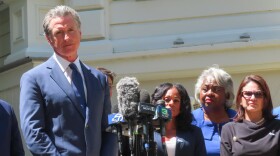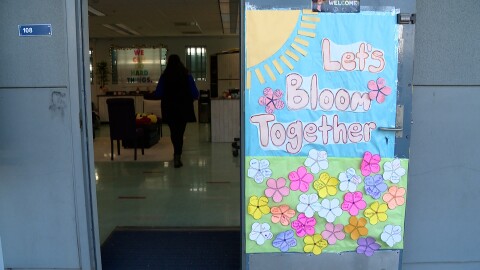
Stephanie Bergsma
Associate General ManagerStephanie Bergsma worked at KPBS from 1982 to 2012. As associate general manager, Bergsma was responsible for major gifts, production underwriting, Gays and Lesbians for Public Broadcasting affinity group and the Producers Club. Her greatest achievements include raising the funds to build the KPBS Copley Telecommunications Center and funding all of the equipment including the HDTV conversion pieces. Stephanie’s relationship with the late Joan Kroc resulted in a bequest of $235 million to National Public Radio and a $5 million bequest to KPBS in November 2003.
Stephanie has served several cultural organizations in San Diego including on the boards of the Museum of Photographic Arts, Francis Parker School, Charter 100 and Voices for Children. She was also one of the first graduates of Lead San Diego and has been active in the La Jolla Playhouse and the San Diego Museum of Art.
-
Life in the idyllic town of Marlow has just about returned to normal, but it’s not long before Judith, Suzie, and Becks are called back into action to solve a series of new crimes. Can they crack the case again? Season 2 of THE MARLOW MURDER CLUB premieres on Sunday, August 24 at 9/8c.
-
Stream now with KPBS Passport / Watch Tuesday, Aug.12, 2025 at 8 p.m. on KPBS TV. A powerful story of the most destructive invention in human history, outlining how America developed the nuclear bomb, how it changed the world and how it continues to loom large in our lives. Witness the raw power and strangely compelling beauty of rare views of above-ground nuclear tests.
-
See how a power play by Soviet leader Nikita Khrushchev backfired, sparking a dangerous confrontation with the U.S. — the Cuban Missile Crisis. Over fifty years later, we still don’t know everything about what happened; many Soviet records are still secret. But this much is clear: October 1962 was the closest the world has ever come to thermonuclear war.
-
In 1946, fear and faith in science collide. For the first time, Americans begin to learn more about the bomb. One in-depth essay about the experiences of the people in Hiroshima creates a sensation and has enormous impact, causing many to rethink nuclear weapons. At the same time, the new Atomic Age is promising miraculous progress in all areas of life, thanks to the wonders of the atom.
-
To create the bomb, a vast industrial complex is built with cities appearing out of nowhere. Thousands of workers are recruited, but are told only enough to do their own job, nothing more. Yet despite the urgency of the crisis, a huge pool of potential talent is virtually ignored. Women are typists and secretaries, and run schools and libraries. But scarcely any scientists or engineers are women.
-
Democrats in the California legislature met over the weekend to negotiate new congressional maps that could potentially play a large role in deciding control of the U.S. House during the midterms.
- How El Cajon became a flashpoint in the fight over immigration
- California’s last beet sugar plant is closing. Can Imperial County keep the industry alive?
- Electric vehicle drivers in California could soon lose HOV lane perk
- Gov. Gavin Newsom, California Democrats announce redistricting plan to counter Texas effort
- Vista approves $3.5 million for Wave Waterpark repairs






